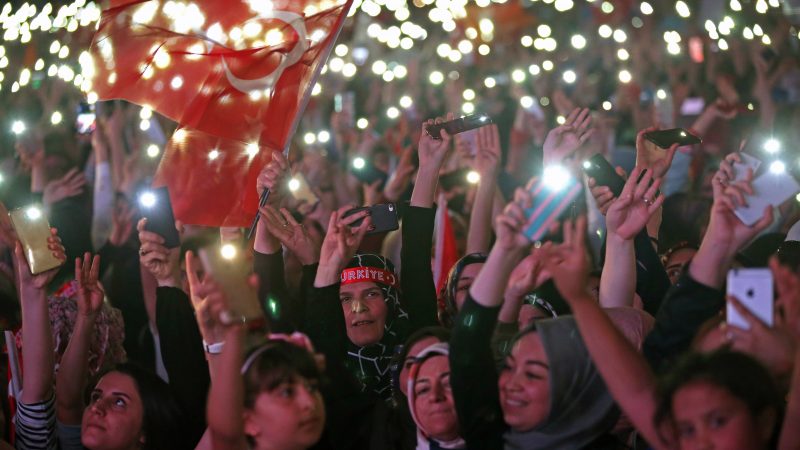 Seda Gürkan is a member of CEVIPOL (Centre d’étude de la Vie Politique) and affiliated researcher at the Institute for European Studes of the ULB (IEE-ULB)
Seda Gürkan is a member of CEVIPOL (Centre d’étude de la Vie Politique) and affiliated researcher at the Institute for European Studes of the ULB (IEE-ULB)
Fundamental issues that might further distance Turkey from the EU
As a result of the June elections, there are mainly three constraining factors that might further distance Turkey from the EU. First, the most striking result of the elections is the rising tide of conservative nationalism. In addition to President Erdogan’s nationalist, anti-Western, Eurosceptic rhetoric, Erdogan’s electoral ally – right-wing, ultranationalist MHP (Nationalist Action Party) – obtained 11.1 percent of the votes. Also, the IYI (Good) Party – another right-wing, conservative, nationalist opposition party that was founded by former members of the MHP – received almost 10 percent of the votes. In the post-election period, MHP is not expected to soften its Eurosceptic position. And both the MHP and IYI Parties will adopt a hard line stance in difficult but critical dossiers such as the Cyprus or Kurdish issue.
The second salient feature of the election result is Turkish society’s polarization. The president’s victory was achieved through a very narrow margin; he received 52,5% of the votes. This outcome points to the consolidation of a long-standing trend in Turkish society in the form of two opposing camps: the pro-Erdogan front and those who feel alienated by the government’s authoritarian turn. On the night of the elections, the president promised to embrace all the segments of society, but it is difficult to foresee whether under the new system Erdogan’s governance model will rely more on pro-reconciliation policies and pluralism or whether he will pursue a non-inclusive line embedded in the majoritarian understanding of democracy, which might further aggravate societal fault lines leading to political instability.
The third and most serious factor that might have far reaching consequences for EU-Turkey relations is the features of the new system. The Turkish-style presidential system, which grants excessive powers to an unconstrained, unaccountable president, and which does not foresee checks and balances between elected and appointed institutions, undermines the fundamental values of the EU, including especially the rule of law and the separation of powers. Indeed, according to the Venice Commission opinion (March 2017), the new system might lead to an “authoritarian and personal regime”.
Fundamental issues that will prevent a rupture in EU-Turkey relations
While accession negotiations have reached a “standstill”, mutual interests and strategic priorities continue to guide relations. The decision of the Council on June 26, 2018, regarding Turkey is a good illustration of the EU’s pragmatic approach to Turkey. The Council, in the face of the reversal of the reform process, decided neither to open any new chapters for negotiations nor to initiate negotiations on the modernization of the EU-Turkey Customs Union. However, Council conclusions reiterate Turkey’s importance as a key partner and highlight essential areas for cooperation, ranging from migration to counter-terrorism. Indeed, these concrete areas of joint interest not only prevent a rupture in relations but also anchor Turkey to the EU.
Besides, neither the EU nor Turkey is ready to bear the cost of losing each other. In case the EU disengages from Turkey, the consequences of a further isolated, increasingly unpredictable and probably highly unstable neighbor might be too costly for Europe to bear. In the same vein, a severe confrontation with the EU is a highly risky alternative for Erdogan given the country’s security concerns in a turbulent region and extremely fragile Turkish economy.
Lastly, the period in the run-up to the elections highlighted the dynamism of Turkey’s opposition. The anti-Erdogan camp, which consisted of four political parties with diverging ideologies and programs was able to assemble around key principles such as democratization, independence of the judiciary, and return to the parliamentary system. Despite snap elections and a particularly unfavorable pre-election context under the state of emergency, the vote margin between Erdogan and the opposition was slim. The nature and the pace of mobilization of the opposition parties and their peaceful pro-democracy rhetoric manifest Turkish society’s heterogeneity and reveal a clear sign that millions of Turkish citizens still remain committed to the democratization agenda. The resilience of these segments of society and the EU’s engagement with them will be key for pulling Turkey into Europe for years to come.
Conclusion: Not too close but not too far away
In light of these considerations, the member states are expected to continue their pragmatic strategy vis-à-vis Turkey, in use since 2016. Unless Turkey can relaunch the reform process, relations are expected to be shaped around common interests in the absence of any decisive step that might bring Turkey too close to the EU such as the opening of new chapters, modernization of the Customs Union or visa liberalization. However, the Council’s resistance to take any decision that may lead to the formal freeze of accession negotiations might be interpreted as the EU’s determination to keep Turkey not too far away. This strategy is instrumental for ensuring Turkey’s commitment to a workable relationship and for managing their interconnectedness.
In conclusion, although Turkey’s transition to the presidential system is not expected to change the EU’s pragmatic approach to Ankara in the short term, any negative change of the above-summarized constraining factors (the pursuance of hard Eurosceptic policies and/or a divisive, majoritarian governance model as well as the acceleration of autocratization) might shift this delicate equilibrium and distance Turkey further away from the EU.
Blogpost: EU-Turkey relations in the aftermath of Turkey’s constitutional referendum
Are the role of the EU in the world and international relations topics that interest you?
Our executive education programmes for professionals include a module with four courses that cover the EU’s main relations with the rest of the globe.




